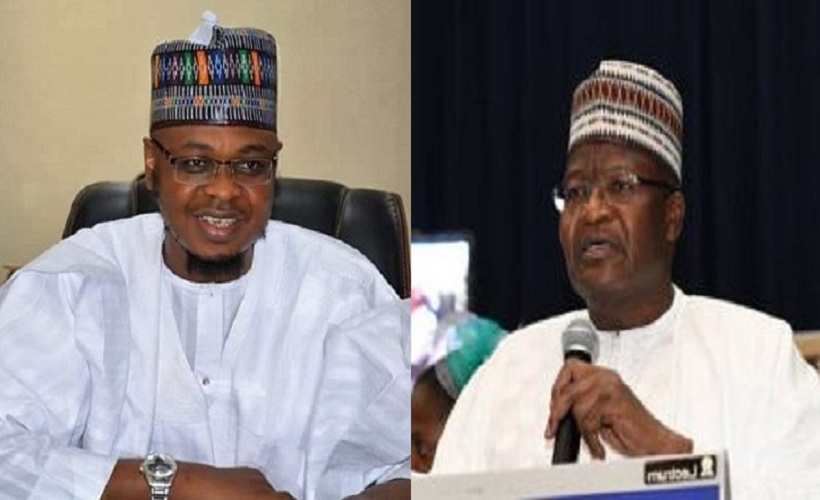By Yakubu MUSA
A cornucopia of glad tidings has recently thronged the doors of Nigeria’s telecoms industry.
It all started with various state governments across the country signing executive orders to either waive or harmonize the Right of Way fees, the perennial industry’s bone of contention, following the successful intervention of the Minister of Communications and Digital Economy, Dr Isa Ali Ibrahim Pantami.
There were also the heart-warming stories of burgeoning contribution to the GDP and other spectacular industry statistics.
Then came the cheering presidential directives, reassuring the industry of the security of telecom infrastructure in the country, just before the cherry on the cake, the renewal of its Chief Regulator’s appointment, Prof Umar Garba Danbatta, by President Muhammadu Buhari GCFR–also on Dr Pantami’s strong recommendation.
“The decision to recommend you for reappointment was to ensure stability in the telecommunications industry and consolidate on the gains and successes already recorded in the industry in the last five years,” said the Minister while hosting NCC’s management staff, shortly after announcing five more years for Danbatta as the chief executive officer.
Dr Pantami is, however, not alone in making this profound observation, as his view quickly struck industry’s cord— with virtually every major stakeholder corroborating it.
For instance, while congratulating the EVC for earning the second term in office, the Chairman of the Association of Licensed Telecoms Operators of Nigeria (ALTON), Gbenga Adebayo, described the reappointment as a testimony of Danbatta’s good leadership.
According to him, the industry has made momentous progress under the watch of the professor of telecommunications engineering and thus the second term will bring about consistency and stability–something that legacy conscious Dr Pantami was looking out for.
“We are very pleased about his appointment for a second tenure and we congratulate Prof. Danbatta as this is a testimony of his good leadership under which the industry has made significant progress and positive impact on our economy,” he observed.

Likewise, his counterpart, the President, Association of Telecoms Companies of Nigeria (ATCON). Mr. Olusola Teniola lauded the reappointment as a testimony to Danbatta’s stakeholder management success story.
“We know that his recommendation is predicated on him being a technocrat, a professional and a promoter of human relations and human capacity who has over the years initiated and implemented successful policies that have a positive impact on businesses and Nigerians, and we are very confident that he is equal to the task ahead,” he stressed.
Expressing a similar sentiment yet, the Chairman of the Nigeria Information Technology Reporters Association (NITRA), Mr. Chike Onwuegbuchi, said Danbatta’s first tenure has yielded so many notable achievements which have brought succour to consumers and sanity to the industry as well as increased revenue to the government’s coffers.
“Your reappointment has come at a time when the industry needs consolidation and tidying up of your noble initiatives. It also comes at a time when the nation, and Africa as a continent, needs to see the success of the National Broadband Plan (NBP), the total digitization of the economy and the acceleration of the InfraCo model, among other developmental efforts to grow the Nigerian economy through ICT.”
Truly, many analysts in the sector have welcomed the news of Danbatta’s reappointment with high expectations. And, their optimism is not far-fetched. The statistics in the industry from August 2015, when he was appointed the EVC of the NCC to date are firmly on the side of their argument.
Under Danbatta’s watch, the industry defied the odds of the economic recession two years ago and emerged as the surprising package of the tumultuous times.
The industry is currently showing a similarly remarkable resilience against the COVID-19 pandemic. Indeed, the sector’s quarterly contribution to Gross Domestic Product (GDP’s) has kept increasing–from 8.50 per cent in August 2015 to as much as 11%.
But at a time when the Federal Government unveiled its digital economy policy as well as the new National Broadband Policy, it’s worth noting that the painstaking implementation of the Danbatta 8-Point Agenda, helped Nigeria reach and surpass its broadband penetration target of 30 per cent. Since then, there’s no going back, with penetration approaching 40% now (39.58% April 2020).
Nigeria now boasts of 190,806,067 subscribers against 151,018,624 in August 2015 while teledensity increased, after its rebasing to 91% in February 2019 to 99.96% currently.
Despite the yearning of consumers for a further bargain in the cost of data, it should be acknowledged that between 2015 and now, the cost of a gigabyte of data has come down by 75 per cent. This has been confirmed in a study by Research ICT Africa (RIA), a policy and regulation think-tank.

Among Danbatta’s initiatives making an impact in the industry is the regime of efficient management of spectrum resource, which is boosting service availability, accessibility and affordability.
It could also be recalled that during one of the industry’s trying moments, Danbatta-led NCC, in collaboration with the Central Bank of Nigeria (CBN), took a very proactive decision to rescue 9Mobile, one of the major mobile network operators, thereby saving jobs and billions of Naira worth of investment.
Danbatta’s regulatory finesse was also behind the listing of telcos such as MTN and Airtel on the Nigerian Stock Exchange, needless to say, their listing has improved the performance of the country’s capital market outlook.
Nigerians had almost given up on witnessing a harmonised emergency communication line in the fashion of 911. It is, therefore, another major feat by Danbatta, when 18 Emergency Communications Centres have now been commissioned, and the nation’s 112 emergency line is functional in 17 states and Federal Capital Territory (FCT), Abuja.
But Danbatta’s leadership of the industry also witnessed increased attention to innovation, research and development- through providing substantial grants to the academics and emerging young ICT entrepreneurs, and innovators.
Perhaps nothing underlines approval of Danbatta’s leadership like the platinum rating the NCC received from the Bureau of Public Service Reform (BPSR) in 2017, the year he dedicated to the consumers of the industry.
The International Telecommunication Union (ITU) in its “ICT Regulatory Tracker’ in 2019, also rated the Commission’s leadership in a similar vein, for responsiveness, and dynamism in regulating the vibrant sector.
*Musa, is the Special Assistant, Media to the Executive Vice Chairman of the NCC

